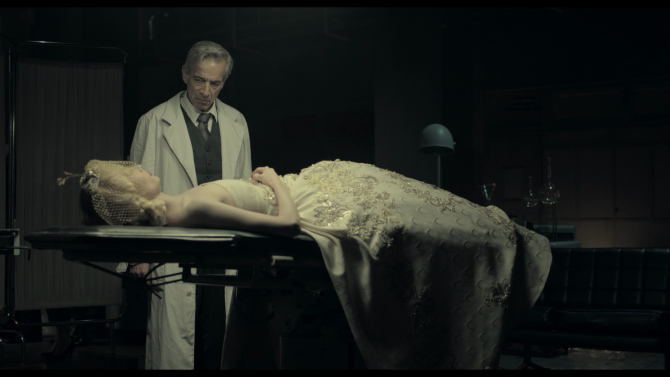Today was our first double-header of TIFF. Though I must say “I love my neighbourhood” at least once a week, today I’m newly in love with it because we live literally in the middle of all the venues. One of them, Jackman Hall, is two minutes from our door. Unfortunately, it’s also the venue with knee- and tailbone-punishing seats. For our double header there on Wednesday, we’ll definitely be bringing cushions.
Today’s movies were French World War I film The Fear and Eva Doesn’t Sleep from Argentina. Both world premieres, both highly artistic, and both slim on story. One I liked, and the other I didn’t.
I’m not going to diss The Fear on the day of its world premiere. It had some beautiful, memorable scenes, but it didn’t say anything about war we haven’t heard before. It wasn’t to my taste.
Eva Doesn’t Sleep deals with the weird journey of the embalmed body of Eva Peron. After her untimely death from cancer at the age of 33, her corpse had been slated for Lenin-style public display but went missing after a military coup and was recovered 16 years later.
The movie has three parts: The Embalmer (deliciously, in Spanish: Embalsamadore), the Transporter, and The Dictator, with a slight framing story where General Emilio Eduardo Massera, the butcher responsible for thousands of murders and disappearances during the 1970s, just froths at the mouth about Eva’s corpse.
The photography during the Embalmer portion was utterly spectacular and very tense. The Transporter section included an impressive one-shot fight scene in an compressed area. The last two sections seemed scripted more like stage plays than movies, giving the actors the opportunity to perform skillfully but not really advancing the story all that much or posing questions to the audience.
Despite the slender story, I appreciated the ambitious filmmaking and the fact that it aspired to deal with Argentina’s post-colonial struggles and difficult, violent past.
Also, there was an interesting parallel with one of our previous TIFF films, Starve Your Dog, which also dealt with decolonialism and the difficulties of getting satisfying answers out of a captured dictator.

